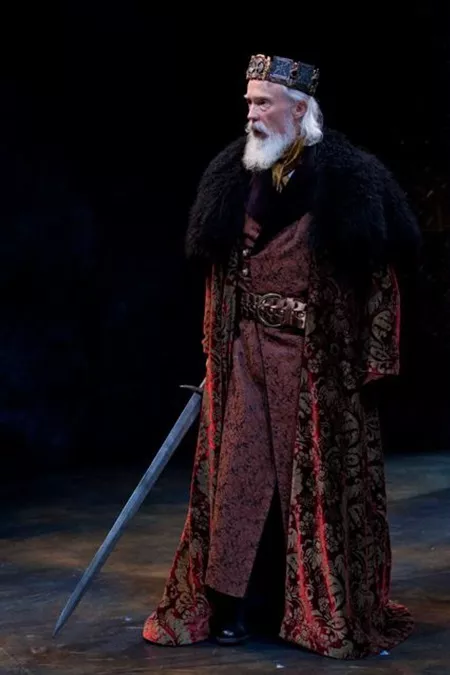
When Graham Smith starred in King Lear up at the North Carolina Shakespeare Festival in 2008, I thought he was the best Lear that I would ever see — outside of my imagination. Now at McGlohon Theatre in the Charlotte Shakespeare Festival running through Sunday, he’s even better than he was in High Point.
More heartfelt and less cerebral. Bringing out more subtle nuances and details. Louder in his fury. Older.
Smith’s first scene, where Lear famously sets about divvying up his kingdom to his three daughters — only to be infuriated by his favorite, Cordelia — is a masterwork of fine acting and judgment. There’s a mighty, edgy Jove in his outsized joviality, fed by the flattering rhetoric of Goneril and Regan, sensationally deflated when the honest, sincere Cordelia gives her anticlimactic answer to Lear’s wrongheaded gambit, “Which of you shall we say doth love us most?” His confidence in Cordelia is so deep that this joviality doesn’t immediately vanish when he hears the artless monosyllabic oration his dearest darling dumps on him. Smith is as kingly in his rage as he is in his foolishness. Volatility is what he does best, so the whole scene is scalded and refreshed by his presence.
A former stalwart in the ancient Charlotte Shakespeare Company that flickered out in the early 90s, director Tim Ross is a perfect partner for Smith, giving him dynamic actions both at the beginning of the play and in the tragic denouement. In between, greatness eludes Smith in the king’s humiliation and disintegration, but by the time Lear is mad, broken, and reborn, Smith regains the magic. I suspect that the main reason for the slight diminution of Smith’s powers in the middle acts are largely caused by the cuts Ross was forced to make to keep the evening under three hours with one intermission.
With Stephen T. Ware as Gloucester, there are two imposing patriarchs in the parallel plots, and the three sisters — always tricky to cast — all hit the sweet spots of their characters. Barbi VanSchaick and Elise Wilkinson, as Goneril and Regan, have been around long enough to be as self-recommending as Ware for local theatergoers, and to make credible daughters for an octogenarian. Less familiar to locals, Gretchen McGinty is perhaps the best Cordelia I’ve seen, luminous but never fragile. Nearly as new, Zack Byrd is a winsome Fool who transitions well from shtick to pathos on the stormy heath.
I’m a wee bit uncomfortable with some of the casting, beginning with Joe Copley as Kent, Lear’s most staunchly loyal subject, who should be a brawler at heart. J.R. Adduci proves capable of Edgar, Gloucester’s virtuous son, particularly when he tosses a sliver or two of Jerry Lewis into his Mad Tom routine. Before his fall from grace, however, Adduci looks tentative and intimidated by his first foray into the Bard. Casting himself as Edgar’s Machiavellian bastard brother, Edmund, Ross isn’t the malignity I’d like him to be, perhaps because I’m accustomed to him in more genial and heroic roles.
After the fine impression he made as the elder Tom in Glass Menagerie this past spring, Ron McClelland does it again as Regan’s husband, the spitfire Duke of Cornwall, and the milder Duke of Albany — preferred by Lear to Cornwall in the very first line of the script — is a role that fits Glenn Hutchinson like a glove. No, there are few blemishes in this production. But while Ross’s set is adequate most of the time and Fred Story pitches in with powerful sound design, little telltale omissions confirm that signing their two Equity leads has left Charlotte Shakespeare a little cash-strapped.
When Kent and Edgar are supposed to be disguised, their hair and/or faces need to alter somewhat as they change costumes. Not a drop of blood — or a trace of Gloucester’s eyeballs — appears in the most barbaric scene. Lear’s throne and the stocks that hold Kent look like they’re cut from the same shabby wood, seemingly retrieved from an ancient outhouse when our national parks switched to modern plumbing. Props that should be visible are often mimed, most notably the map of Lear’s kingdom in the opening. You’d be surprised what Smith could do with a prop like that.
Hopefully, you’ll have the proper attitude toward such penury by the time this majestic production concludes. Namely, after paying nothing to get in, you’ll donate at least a third of what a ticket to this Lear is truly worth when you leave.
